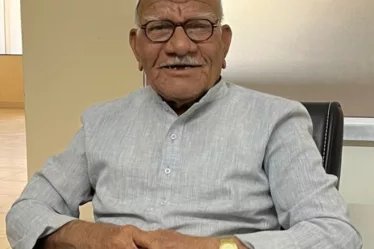It all started on a whim—those small, unexpected moments that often turn into the most memorable.
One winter morning in 1986, while making my rounds at the hospital in Sevagram, an unusual thought crossed my mind: I should learn German. The idea seemed absurd, even to me. But then I learned that Mrs. Sunita Kawale, the wife of Jayant Kawale, CEO of the Zilla Parishad in Wardha, was a trained German teacher. She had casually mentioned her linguistic skills during a visit to the OPD, and suddenly, the idea no longer felt so far-fetched.
Until that point, we barely knew that “German” and “Deutsch” were the same language.
I floated the idea among my colleagues.
“German? What for?” one scoffed. “We’re not heading to Germany anytime soon.”
“It won’t even look impressive on our CVs,” another added. “Hospitals don’t ask if you can say ‘Guten Tag.’”
“Why waste our evenings?” a third laughed. “We might as well watch Nukkad or Wagle Ki Duniya.”
Despite the skepticism, a few students were intrigued. Ganesh Srinivasan and Parthak Pradhan from the 1985 batch, Monica Ahuja Sinha from 1982, Vinaya Agnihotri from 1980, Anjali Ingley Bhure from 1977, Suchitra N. Pandit from 1976 along with Sudha Jain from Anaesthesiology, joined in.
Within a week, our small group had come together, a blend of students, residents, and teachers, each bringing their own energy.
Classes began in the Medicine seminar room, which had since moved to Surgery on the ground floor. Twice a week, from 6 to 8 in the evening, we tackled German alphabets, numbers, and its tricky pronunciations. The grammar felt like a different world. I struggled.
Reading aloud in class made me nervous. “What if I fumble? What if my students laugh at me?” The thought of failing an exam in front of them was unsettling.
But after a month, something shifted. The divide between teacher and student blurred. We became comrades, encouraging one another. In the hospital corridors, we greeted each other with a cheerful 𝘎𝘶𝘵𝘦𝘯 𝘔𝘰𝘳𝘨𝘦𝘯 in the mornings and parted with an “𝘈𝘶𝘧 𝘞𝘪𝘦𝘥𝘦𝘳𝘴𝘦𝘩𝘦𝘯” in the evenings. Counting in German became second nature—“eins, zwei, drei” rolled off our tongues as easily as one, two, three.
The hospital, in our minds, transformed into a 𝘒𝘳𝘢𝘯𝘬𝘦𝘯𝘩𝘢𝘶𝘴, and we were all 𝘈𝘳𝘻𝘵 (doctors). These new words felt like a secret world we’d unlocked, as if they had been waiting for us all along.
Four months later, we sat for the exam. We all passed. I don’t remember the marks, but does it matter now?
Did we celebrate? Maybe with a cup of coffee and a chocolate. The details are hazy, but the warmth of those days remains clear. What started as a whim became one of those small, unexpected adventures that make life richer.
None of us ever made it to Germany. But so what? We had unlocked a new world—even if just a small one. And if nothing else, we could always greet each other with a hearty 𝘎𝘶𝘵𝘦𝘯 𝘛𝘢𝘨 and part ways with an 𝘈𝘶𝘧 𝘞𝘪𝘦𝘥𝘦𝘳𝘴𝘦𝘩𝘦𝘯.
